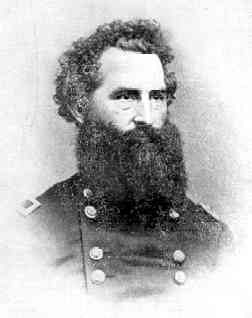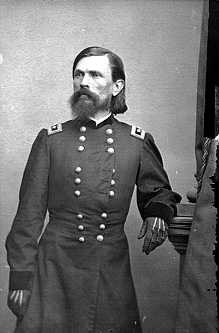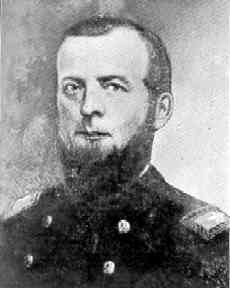Michigan in the Civil War
Parkhurst, John Gibson, 1824-1906.

John Gibson Parkhurst, from Charles W. Bennett, Historical Sketches of the Ninth Michigan Infantry. Coldwater, Mich., 1913.
One hundred and five letters (1861-1866) written to his sisters and to his young daughter. He describes Fort Wayne and the steamer Mississippi; also the camp at West Point, Ky., with a drawing of the streets of tents and of his tent in particular. He writes of sickness in camp, his duties, marches, guerrillas, Vallandigham's crossing, and skirmishes with Morgan. He tells about the crops, the flies, and spring floods. He describes the beauties of the countryside, the conditions of the roads and the supply lines, and the fighting around Murfreesboro, Chattanooga and at Chickamauga, and the siege of Atlanta, with a special account of the battle of Stones River. He also tells of the forming of the 23rd Brigade, the exchange of prisoners, and mustering out. There are comments on General Thomas and a great many on his own family and personal affairs.
Parkhurst was taken prisoner at Murfreesboro in July 1862, spent three months in a Southern prison, and was exchanged in December 1862. He served as lieutenant colonel and colonel in the 9th Michigan Infantry, provost marshal of the 14th Army Corps and of the Military District of Tennessee, and was brevet brigadier general of U. S. Volunteers. Parkhurst was from Coldwater, Mich. From 1866 to 1869 he was marshal of the Michigan District and in 1888-1889 he was Envoy Extraordinary and Minister Plenipotentiary of the United States to Belgium.
The collection also includes letters from a number of other soldiers:
Alf ----. One letter (Jan. 7, 1862) from Alf, surname unknown, at Camp Blair, describing bad officers.

Thomas L. Crittenden,
Library of Congress,
Prints and Photographs Division
[LC-B8172-1730]
Curtis Gazlay, colonel of the 37th Indiana Infantry. One humorous letter (Nov. 19, 1861) written from Elizabethtown, Ky.,in which he describes how he misses the 9th Infantry.
Dr. A. E. Geoghegan, a contract physician with the army. One letter (Feb. 27, 1862) from Jefferson County, Ky.
P. Knappen, of Coldwater, Mich. One letter (Oct. 25, 1863) written in a satirical style, in which Knappen, describing himself as a Copperhead, asks about a place in the army.
Cyrus O. Loomis, of Coldwater, Mich. One letter (Jan. 24, 1862) written from Camp Jefferson, Ky., to Parkhurst about the "false and scurrilous" newspaper articles concerning Colonel Loomis' Battery and its officers, with a letter of vindication from Brigadier General J. J. Reynolds. Loomis entered service in Battery A, 1st Michigan Light Artillery, became captain in May, 1861, colonel in Oct. 1862, and brevet brigadier general in 1865.
William McMichael, assistant adjutant general of the Army of the Cumberland. One letter (Dec. 24, 1863).

George H. Thomas, from Francis Fowler
McKinney papers
William H. Wilkinson, of Romeo, Mich. One letter (Aug. 14, 1862) written from Decherd, Tenn., to Parkhurst, giving news of the regiment while the colonel is on leave. Wilkinson enlisted in Company A, 9th Michigan Infantry, in 1861, was taken prisoner at Murfreesboro and exchanged, became lieutenant colonel in 1863, and was made brevet colonel in 1864 for gallant and meritorious services.
Other materials in the collection include a report (Dec. 1864) of prisoners captured by troops under the command of General George H. Thomas; a claim (Oct. 16, 1862) for two horses lost by Parkhurst in battle at Murfreesboro on July 13, 1862; a list (undated) of persons indicted for treason of conspiracy in the middle district of Tennessee; and a typescript (Feb. 6, 1890) of Parkhurst's recollections of the battle of Stones River.

William H. Wilkinson, from Charles W. Bennett,
Historical Sketches of the Ninth
Michigan Infantry. Coldwater, Mich., 1913.
This collection is available on microfilm for interlibrary loan.